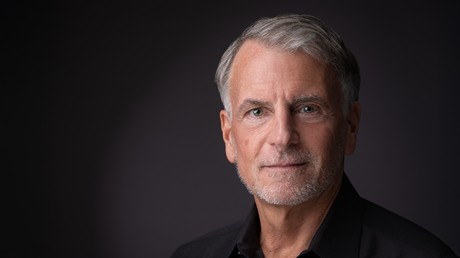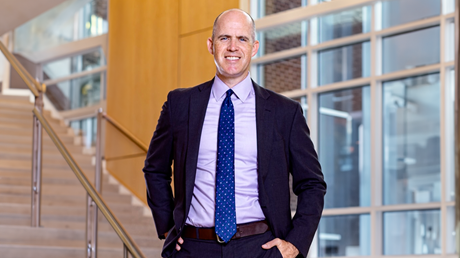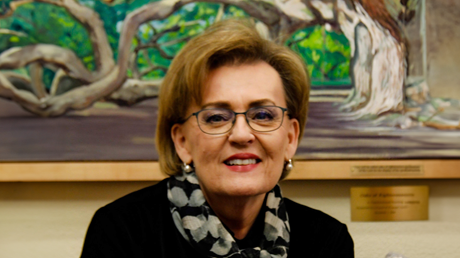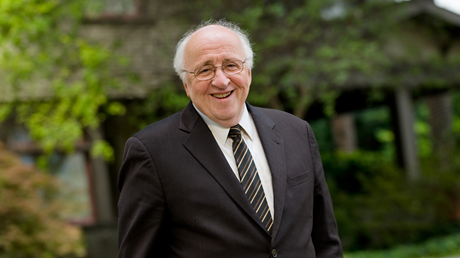
Will you help encourage and connect the church?
Give NowWill you help encourage and connect the church?
Give NowEvangelist Billy Graham awoke from a dream at 2 a.m. one night in late 1953 and wrote out a plan for a new Christian magazine, from its budget to its editorial departments to its name: Christianity Today. He soon found a champion in his father-in-law, Presbyterian lay leader L. Nelson Bell, and a reluctant but prolific editor in Fuller Seminary’s star theologian, Carl F. H. Henry.
While those men were giants in their day, this magazine was never intended as a celebrity vehicle or tribute to the past. (Graham complained that his photo appeared too many times in the first issue.) Nevertheless, we often find CT’s founding documents remarkably prescient. The anxieties and goals that occupied those leaders in 1956 remain ours in 2016, not because we’re overcome by nostalgia but because CT’s early vision was both forward-looking and based in timeless gospel passions. We are as ardent as ever in our “desire to express historical Christianity to the present generation.” Here, then, is the original founding editorial from our first issue, with some midrash.
— Ted Olsen, Director of Editorial Development
WHY CHRISTIANITY TODAY?
Christianity Today has its origin in a deepfelt desire to express historical Christianity to the present generation. Neglected, slighted, misrepresentedA popular narrative has it that evangelicals wish to recapture the dominance they had in the 1950s. The founders of CT didn’t see things that way. “As evangelicals, I am convinced that we are in the majority among both clergy and church members,” Graham said in a 1955 speech raising support for CT. “However … we are divided, confused, and in one sense defeated.” There was no evangelical giant to be awakened, only hearts and minds to be transformed. “Thousands of ministers in the United States … can be won, but they will not be driven, and the first vicious attack we have against some denomination or some council would cause hundreds of young ministers to throw our magazine in the wastebasket,” Graham warned. Criticism, he said, “must be done subtly, and carefully, in love. This magazine should take the responsibility of leading in love, what so much of our evangelical work has failed to do in fighting and name calling.”—evangelical Christianity needs a clear voice, to speak with conviction and loveCT has expressed its passion for Beautiful Orthodoxy in different ways over the years, but the commitment has held steady. “I am convinced that we will win the day with a positive presentation of the basic tenets of the gospel rather than too much defensive apologetics,” Graham advised Henry. A brochure promoting CT before its launch promised it would be “positive and constructive … designed to win men to the evangelical faith.” The temptation of ugly orthodoxy was a driving force behind CT’s creation: “Fundamentalists have been so busy attacking others that they have failed to present adequately the positive aspects of historical Christianity,” the brochure lamented., and to state its true position and its relevance to the world crisis. A generation has grown up unaware of the basic truths of the Christian faith taught in the Scriptures and expressed in the creeds of the historic evangelical churches.
Theological liberalism has failed to meet the moral and spiritual needs of the people.CT still frequently finds itself countering a theological liberalism that rejects Scripture’s authority and God’s transforming power. But perhaps the biggest change since 1956 has been a growing awareness of the insidiousness of moralistic therapeutic deism as well. Like liberal Christianity, it often looks like orthodoxy and can inoculate against true faith. But many are attracted to its preaching and theology, and it’s not easily countered through persuading thought leaders and other elites. These days we’re less likely to encounter a Christian who dis-believes the Virgin Birth than to find a “nominal evangelical” who says the right things about the Bible’s inerrancy but doesn’t read or live its teachings. Neither the man on the street nor the intellectual is today much attracted by its preaching and theology. All too frequently, it finds itself adrift in speculation that solves neither the problem of the individual nor of the society of which he is a part.
For the preacher, an unending source of wisdom and power lies in a return to truly biblical preaching. For the layman, this same Book will prove to be light on the pathway of life, the record of the one who alone meets our needs for now and for eternity.
Christianity Today is confident that the answer to the theological confusion existing in the world is found in Christ and the Scriptures. There is evidence that more and more people are rediscovering the Word of God as their source of authority and power. Many of these searchers for the truth are unaware of the existence of an increasing group of evangelical scholars throughout the world. Through the pages of Christianity Today these men will expound and defend the basic truths of the Christian faith in terms of reverent scholarship and of practical application to the needs of the present generation.
Those who direct the editorial policy of Christianity Today unreservedly accept the complete reliability and authority of the written Word of God. It is their conviction that the Scriptures teach the doctrine of plenary inspiration. This doctrine has been misrepresented and misunderstood. To state the biblical concept of inspiration will be one of the aims of this magazine.
The content of historic Christianity will be presented and defended. Among the distinctive doctrines to be stressed are those of God, Christ, man, salvation, and the last things.“We should not be either amillenial or premillennial,” Graham said. “But certainly this magazine should be extremely pro–second advent. We should present the Second Coming of Christ in all of its glory without getting into the problem of the millennium too deeply.” The best modern scholarship recognizes the bearing of doctrine on moral and spiritual life.CT continues to follow new scholarship from sociology, psychology, and other fields to better understand how doctrine and belief affect moral and spiritual life. It has not lessened our view of doctrine’s power one bit, but we are probably more skeptical than Henry was that right thinking necessarily prompts right action. One key change from 1956 is CT’s eagerness not just to examine historic Christian doctrines, but to tell stories of how they are being lived out today in the real, messy world. This emphasis will find encouragement in the pages of Christianity Today.
True ecumenicityHistorical accounts suggest that there was some disagreement among senior staff (and with CT’s chief financial backer, J. Howard Pew) on ecumenical goals, especially on whether evangelical church leaders should work together on public policy advocacy. But they all believed that CT could be, in Graham’s words, “a new strong vigorous voice to call us together that will have the respect of all evangelicals of all stripes within our major denominations.” will be fostered by setting forth the New Testament teaching of the unity of believers in Jesus Christ. External organic unity is not likely to succeed unless the unity engendered by the Holy Spirit prevails. A unity that endures must have as its spiritual basis a like faith, an authentic hope, and the renewing power of Christian love.
National stability and survival depend upon enduring spiritual and moral qualities. Revival as the answer to national problems may seem to be an oversimplified solution to a distressingly complex situation. Nevertheless statesmen as well as theologians realize that the basic solution to the world crisis is theological. Christianity Today will stress the impact of evangelism on life and will encourage it.We still believe that the main way God changes the world is through changed lives. This has never meant that we think there is no role for social movements and robust public policy. On the contrary, before he came to CT, Carl Henry’s best-known work was The Uneasy Conscience of Modern Fundamentalism, a jeremiad against fundamentalism’s “indifference to world evils” like “aggressive warfare, racial hatred and intolerance, the liquor traffic, [and] exploitation of labor.”
Christianity Today will apply the biblical revelation to the contemporary social crisis, by presenting the implications of the total gospel message for every area of life. This fundamentalism has often failed to do. Christian laymen are becoming increasingly aware that the answer to the many problems of political, industrial, and social life is a theological one. They are looking to the Christian church for guidance, and they are looking for a demonstration of the fact that the gospel of Jesus Christ is a transforming and vital force. We have the conviction that consecrated and gifted evangelical scholarship can provide concrete proof and strategic answers.
Christianity Today takes cognizance of the dissolving effect of modern scientific theory upon religion. To counteract this tendency, it will set forth the unity of the divine revelation in nature and Scripture.
Three years in a theological seminary is not sufficient to prepare a student fully for the ministry. Christianity Today will seek to supplement seminary trainingCT doubled down on this in 1980 with the launch of Leadership Journal. We now publish CT Pastors, Building Church Leaders, Church Law & Tax, Church Finance Today, Preaching Today, Gifted for Leadership, and other titles designed to support pastors and other church leaders. with sermonic helps, pastoral advice, and book reviews, by leading ministers and scholars.
The interpretation of the news becomes more and more important in the present world situation. Correspondents conversant with local conditionsBilly Graham’s global networks were already astounding by 1956. Bell (a renowned medical missionary) and Henry had outsized international Rolodexes, too. Now communications technology and CT’s own networks have grown so much that we’re able to cover even more of the world and put a greater emphasis on hearing from local Christian leaders rather than expatriates and missionaries, as we often had to in the past. Graham wanted CT to have “the greatest religious news coverage of any magazine in the United States.” We are now widely respected as having achieved that goal. have been enlisted in the United States and abroad. Through their reports Christianity Today will seek to provide its readers with a comprehensive and relevant view of religious movements and life throughout the world.
While affirming the great emphases of the historic creeds, this magazine will seek to avoid controversial denominational differences. It does not intend to concern itself with personalities or with purely internal problems and conflicts of the various denominations. If significant enough,CT “is at its best when it goes beyond simply reporting facts … to exploring significance,” says one of many documents guiding our news coverage. Because we believe that “the basic solution to the world crisis is theological,” size is rarely enough to qualify a personality or controversy as significant; we look for what truth or idea they illuminate. We try hard not to cover controversies or celebrities just because they’re hot at the moment. these will be objectively reported.
Into an era of unparalleled problems and opportunities for the church comes Christianity Today with the firm conviction that the historic evangelical faith is vital for the life of the church and of the nations. We believe that the gospel is still the power of God unto salvation for all who believe; that the basic needs of the social order must meet their solution first in the redemption of the individual; that the church and the individual Christian do have a vital responsibility to be both salt and light in a decaying and darkening world.
Believing that a great host of true Christians, whose faith has been impaired, are today earnestly seeking for a faith to live by and a message to proclaim, Christianity Today dedicates itself to the presentation of the reasonableness and effectiveness of the Christian evangel. This we undertake with sincere Christian love for those who may differ with us, and with whom we may be compelled to differ, and with the assurance in our hearts that God’s Holy Spirit alone can activate any vital witness for him.This editorial didn’t end with it, but several early external documents explaining the launch of CT added this sentence: “To this end, Christianity Today solicits prayer, support, and constructive criticism.” We still do, and we thank you for what you’ve already offered these past 60 years.







